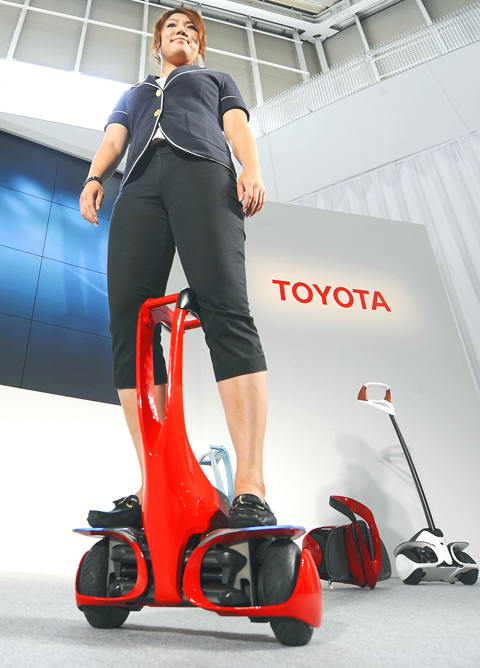Japanese automaker Toyota showed a motorized stand-up-and-ride contraption yesterday that would help people scoot around at malls and airports.
But the “Winglet” — so named for supposedly helping people move as though they had grown wings — takes some getting used to.
At a test ride, a demonstrator accompanying a reporter trying it out refused to let go of the machine — repeatedly expressing fears it may crash or get maneuvered incorrectly and cause injury.

PHOTO: AP
The two-wheeler is similar to a Segway, except it’s slower, going up to 6kph, about the same speed as pedestrians. Segway models can reach up to 20kph.
It stops easily with little pressure, pivots full-circle and has been developed to be safe in crowded areas, Toyota Motor Corp says. It also goes smoothly over bumps.
It is designed to respond almost intuitively — moving forward when you lean to the front, and turning when you sway to the right or left, similar to skiing. One of three models shown comes with a protruding handle that can be grabbed and used like a steering wheel.
But Winglet has a long way to go before it can be a practical option for its intended audience of the elderly and others who find long-distance walking strenuous.
This reporter found it bit of a challenge to travel a short flat course at a showroom. Its movements were sometimes jerky because you weren’t sure how to position your weight to control it.
More seasoned riders, like Toyota engineers, were zipping around as though the thing was a skateboard.
Toyota said it would start testing Winglet later this year at a Japanese airport and resort complex and next year at a shopping mall to get public feedback. Overseas test plans are undecided.
The smallest version of Winglet, weighing 9.9kg, can be folded up to be carried around in commuter trains or packed in car trunks, Toyota said.
Toyota envisions a future in which Winglet will be packed with wireless technology so it relays shopping information at stores. Or it may move on its own and go recharge its batteries or come pick you up when you beckon it, toting your luggage.

EUROPEAN TARGETS: The planned Munich center would support TSMC’s European customers to design high-performance, energy-efficient chips, an executive said Taiwan Semiconductor Manufacturing Co (TSMC, 台積電), the world’s largest contract chipmaker, yesterday said that it plans to launch a new research-and-development (R&D) center in Munich, Germany, next quarter to assist customers with chip design. TSMC Europe president Paul de Bot made the announcement during a technology symposium in Amsterdam on Tuesday, the chipmaker said. The new Munich center would be the firm’s first chip designing center in Europe, it said. The chipmaker has set up a major R&D center at its base of operations in Hsinchu and plans to create a new one in the US to provide services for major US customers,

The Ministry of Transportation and Communications yesterday said that it would redesign the written portion of the driver’s license exam to make it more rigorous. “We hope that the exam can assess drivers’ understanding of traffic rules, particularly those who take the driver’s license test for the first time. In the past, drivers only needed to cram a book of test questions to pass the written exam,” Minister of Transportation and Communications Chen Shih-kai (陳世凱) told a news conference at the Taoyuan Motor Vehicle Office. “In the future, they would not be able to pass the test unless they study traffic regulations

‘A SURVIVAL QUESTION’: US officials have been urging the opposition KMT and TPP not to block defense spending, especially the special defense budget, an official said The US plans to ramp up weapons sales to Taiwan to a level exceeding US President Donald Trump’s first term as part of an effort to deter China as it intensifies military pressure on the nation, two US officials said on condition of anonymity. If US arms sales do accelerate, it could ease worries about the extent of Trump’s commitment to Taiwan. It would also add new friction to the tense US-China relationship. The officials said they expect US approvals for weapons sales to Taiwan over the next four years to surpass those in Trump’s first term, with one of them saying

‘COMING MENACINGLY’: The CDC advised wearing a mask when visiting hospitals or long-term care centers, on public transportation and in crowded indoor venues Hospital visits for COVID-19 last week increased by 113 percent to 41,402, the Centers for Disease Control (CDC) said yesterday, as it encouraged people to wear a mask in three public settings to prevent infection. CDC Epidemic Intelligence Center Deputy Director Lee Chia-lin (李佳琳) said weekly hospital visits for COVID-19 have been increasing for seven consecutive weeks, and 102 severe COVID-19 cases and 19 deaths were confirmed last week, both the highest weekly numbers this year. CDC physician Lee Tsung-han (李宗翰) said the youngest person hospitalized due to the disease this year was reported last week, a one-month-old baby, who does not